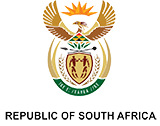Dear Fellow South African,
Last year was a milestone for the country’s flourishing vehicle manufacturers, when the six millionth vehicle built in South Africa was exported. It was also a record year for new vehicle exports, reaching nearly 400,000 vehicles.
These figures are significant for a number of reasons. They show that our auto sector continues to grow despite a gloomy global economic outlook and disruptions to the flow of goods between countries.
The growth of the automotive sector also demonstrates the potential of South Africa as an investment destination. It is a good example of how committed investors, supported by government policies and programmes, can achieve good returns for their shareholders while contributing significantly to the South African economy.
A number of the world’s leading auto manufacturers like BMW, Volkswagen, Mercedes-Benz, General Motors, Ford, Toyota, Nissan and others continue to expand their presence in the country with increased investment.
By way of example, Volkswagen last month announced a R4 billion investment to expand its Kariega plant in the Eastern Cape in preparation for the production of a new vehicle model expected to roll off the assembly line in 2027. This investment is expected to secure the livelihoods of approximately 3,500 workers and support an additional estimated 50,000 indirect jobs and opportunities.
South Africa’s value as an investment destination extends across many other industries, as local and international companies continue to either expand their investments or undertake new investments. Investment is important because, among other things, it creates employment, supports the growth of emerging suppliers, generates revenue for the country, and, in doing so, supports our efforts to reduce poverty and inequality.
According to a recent report by PwC, net foreign direct investment (FDI) into South Africa has been consistently positive since the global financial crisis of 2007 to 2009. This means that the inflow of investment has been greater than the outflow.
Last year, FDI inflows amounted to R96.5 billion, equivalent to 1.4 per cent of our gross domestic product (GDP). This supports a trend where foreign direct investment has, on average, been far greater over the last five years than over the previous decade.
The manufacturing sector is the largest destination of foreign investment, followed by mining and quarrying and financial services. This shows the progress we have made in entrenching supportive industrial policy.
The PwC report notes that South Africa has attractive fundamentals, such as world-class financial services and communications industries, deep capital markets, abundant natural resources and a transparent legal system. Furthermore, South Africa is “a strategic geographical location for entry into the rest of sub-Saharan Africa.”
South Africa is a stable democracy with robust institutions. We have good relations with countries on our own continent and across the world, and favourable trade relations with a number of large markets. Our tertiary institutions produce skilled graduates and useful research.
Since this administration took office, we have held five well-attended Investment Conferences that have attracted R1.5 trillion in investment commitments across a broad range of economic sectors.
Over one-third of these pledges have translated into job-creating businesses and business expansions in renewable energy, mining, packaging, automotive, retail, manufacturing, transportation and other sectors.
While there is a broadly positive attitude towards South Africa among investors, our FDI as a percentage of GDP is slightly lower than the global average. It needs to be much higher if we are to drive sustainable growth.
That is why we continue to work to implement our policies and align regulatory and other obstacles, so that we can attract higher levels of investment. Through the auction of broadband spectrum and progress in digital migration, for example, we have greatly expanded opportunities in telecommunications.
We have significantly reduced waiting times for water use licences and other authorisations that are so important for getting major investment projects off the ground. We are working to get rid of other forms of red tape that impede and slow down investment.
Electricity has been a major challenge to our people and the economy at large. Through our Energy Action Plan, we have made much progress in dealing with the country’s electricity crisis. We have seen an improvement in the performance of Eskom’s power stations and substantial investment in new generation capacity. This has contributed to a sustained decrease in the severity of load shedding.
The work we are doing with business, labour and other social partners in improving the efficiency of our ports and rail infrastructure is also starting to bear fruit. Further progress in these areas will increase the country’s competitiveness and attractiveness as an investment destination.
We have invested a lot of effort into improving our capacity to plan, package and finance major infrastructure projects, creating new investment opportunities in energy, housing, logistics, manufacturing and other areas.
We will continue to build on the gains that we have made towards creating an enabling business and investment climate that promotes economic growth and creates jobs.
It is only through attracting higher levels of investment, both foreign and domestic, that a swift, sustainable economic recovery can be assured.
With best regards,

- Tags:
- Foreign investment /
- Investment Conference /
- Economic recovery /
- Jobs /
- Employment /
- Manufacturing
Tweet




